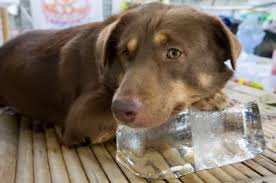
Watching your dog suffer through the violent, uncontrolled spasms of a seizure can be a very distressing sight, especially if you have never seen a seizure before or are unsure about what to do. While seizures are generally not dangerous to your dog, pet owners should be aware that seizures can indicate other underlying conditions and even cause subsequent problems. So it is always best to know what to do in the event of your dog experiencing a seizure, as well as when you should consider it as an animal emergency and call a 24hr vet clinic.
Also known as convulsions or fits, seizures are one of the most frequently seen neurological problems in dogs and consist of three phases. The first phase, known as the pre-ictal phase or aura, is a period where your dog may display abnormal behaviour, such as appearing nervous and restless, trying to hide or to find you, whining, shaking and salivating. This phase normally lasts between a few seconds to a few hours.
The second phase, or ictal phase, is the actual seizure itself, which lasts between a few seconds to about five minutes. During this phase, the muscles in your dog’s body will start to contract strongly, usually causing it to fall on its side with its head drawn backward and then appear paralysed while shaking uncontrollably. Your dog will generally be unresponsive during this time and may experience hallucinations. Involuntary urination, defecation and salivation can often occur during this period as well.
The third phase, or post-ictal phase, is the period where your dog will be coming out of the seizure and appear confused, disorientated and restless. They can also experience temporary blindness and memory loss, which may lead to further behavioural changes, such as not recognising you, aggression, pacing or running in circles. This phase can last between a few minutes to a few hours.
During the actual seizure, your dog doesn’t feel any pain and is generally unaware of what is happening. So the best thing to do is stay calm and move dangerous objects away from your pet so it can’t get hurt. If you are unable to move objects away from your dog, then move the animal carefully to a safe area where it cannot hurt itself or fall. Always remember that you should never try to restrain your dog during the seizure, as this may cause further harm. Also ensure that you do not place your hands near your dog’s mouth – animals cannot swallow their own tongue during seizures, but they may accidentally bite you.
There are many causes of seizures in dogs, with epilepsy being the most common. Other causes may also include liver disease, kidney failure, poisoning or brain tumours. To determine the cause, our 24hr emergency vets will need to thoroughly check your dog’s history for previous signs of seizures or abnormal behaviour. A physical examination and blood and urine tests will also need to be performed at our Melbourne animal hospitals to check for toxins or underlying illnesses or disorders of the liver, kidneys, electrolytes or blood sugar levels.
Depending on the severity and frequency of the seizures and the test results, the emergency vet may refer your dog to a Medicine Specialist for further tests and ongoing vet care. These further tests may include spinal fluid analysis, a CT scan or an MRI to look for brain diseases, inflammation, infections or tumours that may be causing the seizures. If your pet experiences more than one seizure every two months, status epilepticus, or two or more seizures in a 24-hour period, then they will generally be given anticonvulsant medication. This medication acts to prevent and reduce the frequency and severity of seizures and may need to be taken for life in some pet care cases.
Your pet needs to be seen by one of our 24-hour vets at our animal emergency centres for immediate vet care if your dog has never had a seizure before, or if they have had more than two seizures in a 24-hour period, or if the seizure lasts for longer than 5 minutes, or if they do not return to completely normal behaviour within 30 minutes after a seizure.
A seizure lasting longer than 5 minutes, known as Status Epilepticus, is especially serious and a potentially life threatening situation. If this occurs then your pet will need intravenous medication immediately or they may die. Please bring your family pet to see our experienced emergency vets so we can provide the best and most advanced vet care available in Melbourne.
In case of seizures or any emergency, please phone one of our 24 hour Animal Accident & Emergency Centres:
Essendon Fields (03) 9379 0700
Point Cook (03) 8368 7400
We’re Always Open, We Always Care

www.animalemergency.com.au

















































